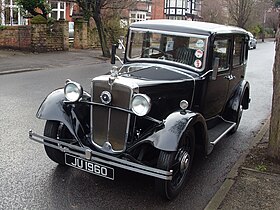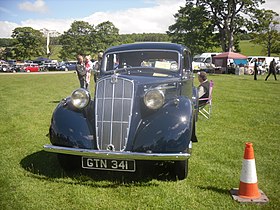Morris 10
| Morris Ten | |
|---|---|

Ten 1292cc 6-light 4-door fixed head saloon
first registered March 1933 |
|
| Overview | |
| Manufacturer | Morris |
| Production | 1932–1948 |
| Assembly | Cowley, Oxford, Oxfordshire, United Kingdom |
| Body and chassis | |
| Class | Mid-size car |
| Layout | FR layout |
| Chronology | |
| Successor | Morris Oxford MO |
| Morris Ten Morris Ten Four |
|
|---|---|

Ten Four 4-door 6-light saloon
|
|
| Overview | |
| Production | 1932–1935 49,238 produced (including Ten Six models) |
| Body and chassis | |
| Body style | 4-door 6-light saloon 4-door tourer 2-door Special fixed head coupé Open two seater |
| Powertrain | |
| Engine | 1,292 cc (1.3 L) Morris Sidevalve I4 |
| Transmission | 4-speed manual |
| Dimensions | |
| Wheelbase | 96 in (2,438 mm) |
| Length | 147 in (3,734 mm) |
| Morris Ten Six | |
|---|---|

Ten Six 4-door six-light saloon 1934
|
|
| Overview | |
| Production | 1934-1935 production – see Ten-Four |
| Body and chassis | |
| Body style | 4-door saloon 5-door Traveller's saloon Open two-seater 4-door tourer 2-door Special coupé Special sports |
| Powertrain | |
| Engine | 1,378 cc (1.4 L) Morris Sidevalve I6 |
| Transmission | 3-speed manual |
| Dimensions | |
| Wheelbase | 102 in (2,591 mm) |
| Morris Ten series II | |
|---|---|

series II 4-door six-light saloon
Easiclene pressed steel wheels |
|
| Overview | |
| Production | 1935–1937 59,364 (including Morris Twelve series II) produced |
| Body and chassis | |
| Body style | 4-door saloon 2-door coupé |
| Powertrain | |
| Engine | 1,292 cc (1.3 L)Morris Sidevalve engine I4 |
| Transmission | 3-speed manual 4-speed manual |
| Dimensions | |
| Wheelbase | 98 in (2,489 mm) |
| Morris Ten series III | |
|---|---|

Ten series M saloon 1938
|
|
| Overview | |
| Production | 1938 13,719 produced |
| Body and chassis | |
| Body style | 4-door saloon 3-foot coupé |
| Powertrain | |
| Engine | 1,292 cc (1.3 L) Morris overhead valve engine I4 |
| Transmission | 4-apeed manual |
| Dimensions | |
| Wheelbase | 98 in (2,489 mm) |
| Length | 160 in (4,064 mm) |
| Width | 61 in (1,549 mm) |
| Height | 64 in (1,626 mm) |
| Morris Ten Series M | |
|---|---|

1940 Morris Ten Series M (Australia)
|
|
| Overview | |
| Production | 1938–1948 27,020 produced pre war 53,566 produced post war |
| Assembly |
United Kingdom Australia |
| Body and chassis | |
| Body style | 4-door saloon 2-door pick up (wartime only) |
| Related | Wolseley Ten |
| Powertrain | |
| Engine | 1,140 cc (1.1 L) Morris XPAG overhead valve engine I4 |
| Transmission | 4-speed manual |
| Dimensions | |
| Wheelbase | 94 in (2,388 mm) |
| Length | 158 in (4,013 mm) |
| Width | 61 in (1,549 mm) |
| Height | 65 in (1,651 mm) |
The Morris Ten announced 1 September 1932 was a medium-sized car introduced for 1933 as the company's offering in the important 10 hp sector of the British market. It continued through a series of variants until October 1948 when along with Morris's Twelve and Fourteen it was replaced by the 13.5 hp Morris Oxford MO.
Morris Ten was a new class of car for Morris now equipped with wire wheels and a new type of mud guarding—domed wings with wing side shields—it was powered by a Morris 1292 cc four-cylinder side-valve engine employing a single SU carburettor which produced 24 bhp at 3,200 rpm. The gearbox was a four-speed manual transmission unit, and Lockheed hydraulic brakes were fitted.
The October 1932 Olympia Motor Show introductory prices:
Body styles at launch in August 1932 were restricted to a saloon and two-door coupé, but a four-door tourer joined the range in December, followed in 1934 by a two-seater with dickey seat and a Traveller's Saloon.
Ten Four badge
Ten Four Special coupé
with sliding head
Open two-seater
with dickey
Closed dickey seat
Ten Four with luggage
on the fold-down rack
Twelve months later, with the introduction of the Ten Six, Four was added to the Ten's name. The chassis was strengthened, engine mountings were revised and synchromesh appeared on the gearbox. Engine output was increased to 27½ bhp by April 1934. Two tone paint schemes were optional from 1935.
On 28 August 1933 a 12 hp six-cylinder version of the Ten was announced on the longer-wheelbase chassis of the Cowley Four.
A sporting version, the Ten-Six Special was also made in small numbers with tuned engine and twin SU carburettors. the standard body was an open four-seater, but some chassis were supplied to coachbuilders.
...
Wikipedia
